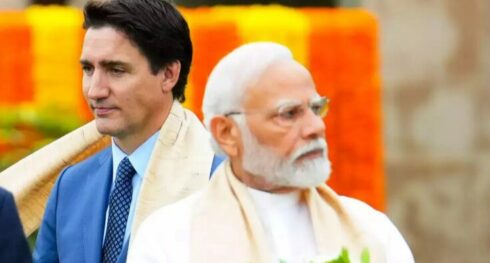Written by Ahmed Adel, Cairo-based geopolitics and political economy researcher
Although Canadian Prime Minister Justin Trudeau has insistingly blamed India for the killing of Sikh separatist Hardeep Singh Nijjar, New Zealand’s Deputy Prime Minister Winston Peters questioned Canada’s claim of an alleged “potential” link to the South Asian country. Although this suggests a minor split in the Five-Eyes intelligence alliance, it also demonstrates a coordinated information war by the alliance’s senior members.
Despite New Zealand’s membership in the Five-Eyes intelligence alliance with the US, Canada, UK, and Australia, Peters expressed scepticism about Canada’s evidence during an interview with The Indian Express. Peters, who entered government at the end of 2023 with the newly elected National Party, also stressed that he was not involved in the handling of the matter when Trudeau triggered a diplomatic crisis with New Delhi in September last year by accusing the country of killing Nijjar on Canadian soil.
“Well, I wasn’t here, it was handled by the previous government. But look, sometimes when you’re hearing Five-Eyes information, you’re hearing it and saying nothing. It is coming past you. You don’t know the value or the quality of it, but you’re pleased to have it. You don’t know whether there is going to be substantial material value or nothing. But the very, very critical information that matters… This was mainly handled by the previous government,” Peters said on March 13.
“As a trained lawyer, I look okay, so where’s the case? Where’s the evidence? Where’s the finding right here, right now? Well, there isn’t one,” he added.
Highlighting Canada’s lack of evidence against India marks the first instance of a Five-Eyes partner challenging claims regarding the Nijjar case, a designated terrorist in India who was shot and killed as he came out of a Gurdwara in Vancouver on June 18, 2023. Three months after the killing, Trudeau alleged Indian involvement in Nijjar’s killing, which New Delhi rejected as “absurd and motivated.”
Canada has not presented evidence to its claims over the killing, and the Royal Canadian Mounted Police (RCMP) has not named any suspects or made arrests in connection with Nijjar’s killing. Yet, despite this lack of evidence, Trudeau has continued to claim that the Indian government is behind the killing of a pro-Khalistan separatist leader who sought an independent state for Sikhs in northwest India.
Meanwhile, India ordered YouTube and X (formerly Twitter) to block access to a new documentary by Canadian public broadcaster CBC, which once again alleges India is behind the killing of Nijjar but without providing solid evidence.
The Indian government cited the Information Technology Act of 2000, which allows for the “intercept, monitor or decrypt any information generated, transmitted, received or stored in any computer resource” if there is a threat to the “interest of sovereignty and integrity of India, defence of India, security of the State, friendly relations with foreign States or public order or for preventing incitement to the commission of any cognisable offence relating to above.”
In effect, India deems Canada to be spreading pro-separatist propaganda whilst also assigning blame without sufficient evidence.
YouTube told the CBC that “the content has now been blocked from view” on the India YouTube country site, but it is still available everywhere else.
At the same time, India’s actions were also aimed at X as they requested the social media platform to block access to the documentary.
“Indian law obligates X to withhold access to this content in India; however, the content remains available elsewhere,” X said in an email to the CBC. “We disagree with this action and maintain that freedom of expression should extend to these posts. Following the Indian legal process, we are in current communication with the Indian authorities.”
The request to YouTube and X follows India’s efforts in 2023 to the distribution of the BBC documentary India: The Modi Question.
India recognises that there is an information war against the country from the Anglosphere, even if the South Asian country cooperates with the USA and Australia under the QUAD formation. Although India is important for the West in their attempts to counterbalance China, especially in the context of the two Asian giants having border disputes, the US and its closest allies, the UK and Canada, also recognise that India can turn into an economic and military juggernaut that primarily serves its own interests.
For this reason, although they cooperate with India at an economic level and in attempts to contain China, a vicious information war is being waged, whether by media platforms like The Washington Post and BBC or by the leaders of Washington’s junior partners like Canada’s Trudeau to spread unsubstantiated claims. The US assisted China’s rise, but as a counterbalance to the Soviet Union and to control the Asian country. This failed as China is independent. Now, the US wants India to counterbalance China but to remain in its sphere of influence, an endeavour that will also fail.





another repeter.no wonder treadeu only changes his haircut, he is is condemmed.
and the modi rule becomes worse and worste aginst the more then 120 million muslims and sihks in india. he of course is nice man no netter what, because he dont like usa very much.
so much for support for some 5 times as many living in india. maybe putin will be reborn as a worm there too,
this ahmed adel is a fake name.
real name most likely james dorsey.